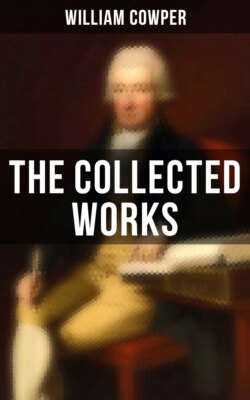Читать книгу The Collected Works - William Cowper - Страница 237
На сайте Литреса книга снята с продажи.
TO THE REV. WILLIAM UNWIN.
ОглавлениеTable of Contents
Olney, Sept. 29, 1783.
My dear William—We are sorry that you and your household partake so largely of the ill effects of this unhealthy season. You are happy however in having hitherto escaped the epidemic fever, which has prevailed much in this part of the kingdom, and carried many off. Your mother and I are well. After more than a fortnight's indisposition, which slight appellation is quite inadequate to the description of all I suffered, I am at length restored by a grain or two of emetic tartar. It is a tax I generally pay in autumn. By this time, I hope, a purer ether than we have seen for months, and these brighter suns than the summer had to boast, have cheered your spirits, and made your existence more comfortable. We are rational: but we are animal too; and therefore subject to the influences of the weather. The cattle in the fields show evident symptoms of lassitude and disgust in an unpleasant season: and we, their lords and masters, are constrained to sympathize with them: the only difference between us is, that they know not the cause of their dejection, and we do, but, for our humiliation, are equally at a loss to cure it. Upon this account I have sometimes wished myself a philosopher. How happy, in comparison with myself, does the sagacious investigator of nature seem, whose fancy is ever employed in the invention of hypotheses, and his reason in the support of them! While he is accounting for the origin of the winds, he has no leisure to attend to their influence upon himself; and, while he considers what the sun is made of, forgets that he has not shone for a month. One project indeed supplants another. The vortices of Descartes gave way to the gravitation of Newton, and this again is threatened by the electrical fluid of a modern.[196] One generation blows bubbles, and the next breaks them. But in the meantime your philosopher is a happy man. He escapes a thousand inquietudes to which the indolent are subject, and finds his occupation, whether it be the pursuit of a butterfly or a demonstration, the wholesomest exercise in the world. As he proceeds, he applauds himself. His discoveries, though eventually perhaps they prove but dreams, are to him realities. The world gaze at him as he does at new phenomena in the heavens, and perhaps understand him as little. But this does not prevent their praises, nor at all disturb him in the enjoyment of that self-complacence, to which his imaginary success entitles him. He wears his honours while he lives, and, if another strips them off when he has been dead a century, it is no great matter; he can then make shift without them.
I have said a great deal upon this subject, and know not what it all amounts to. I did not intend a syllable of it when I began. But, currente calamo, I stumbled upon it. My end is to amuse myself and you. The former of these two points is secured. I shall be happy if I do not miss the latter.
By the way, what is your opinion of these air balloons? I am quite charmed with the discovery. Is it not possible (do you suppose?) to convey such a quantity of inflammable air into the stomach and abdomen, that the philosopher, no longer gravitating to a centre, shall ascend by his own comparative levity, and never stop till he has reached the medium exactly in equilibrio with himself? May he not, by the help of a pasteboard rudder attached to his posteriors, steer himself in that purer element with ease, and again by a slow and gradual discharge of his aerial contents, recover his former tendency to the earth, and descend without the smallest danger or inconvenience? These things are worth inquiry, and (I dare say) they will be inquired after as they deserve: the pennæ non homini datæ are likely to be less regretted than they were; and perhaps a flight of academicians and a covey of fine ladies may be no uncommon spectacle in the next generation. A letter which appeared in the public prints last week convinces me that the learned are not without hopes of some such improvement upon this discovery. The author is a sensible and ingenious man, and, under a reasonable apprehension that the ignorant may feel themselves inclined to laugh upon a subject that affects himself with the utmost seriousness, with much good manners and management bespeaks their patience, suggesting many good consequences that may result from a course of experiments upon this machine, and amongst others, that it may be of use in ascertaining the shape of continents and islands, and the face of wide-extended and far distant countries, an end not to be hoped for, unless by these means of extraordinary elevation, the human prospect may be immensely enlarged, and the philosopher, exalted to the skies, attain a view of the whole hemisphere at once. But whether he is to ascend by the mere inflation of his person, as hinted above, or whether in a sort of band-box, supported upon balloons, is not yet apparent, nor (I suppose) even in his own idea perfectly decided.
Yours, my dear William,
W. C.
